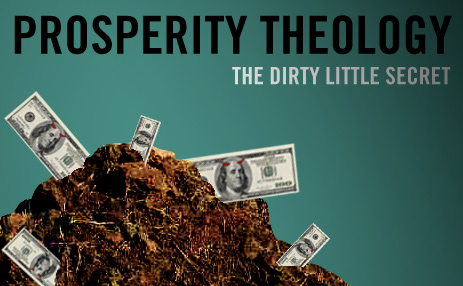Latest
-
Objections to the Christian Faith from the Unchurched and De-Churched
 Tue Dec 02, 2014
Tue Dec 02, 2014
by Resurgence -
Craig Groeschel: We Innovate for Jesus
 Tue Oct 14, 2014
Tue Oct 14, 2014
by Resurgence -
Mark Driscoll: Revelation
 Tue Oct 07, 2014
Tue Oct 07, 2014
by Resurgence -
RESURGENCE LEADERSHIP #034: JOHN PIPER, WHY I TRUST THE SCRIPTURES, PART 2
 Tue Sep 30, 2014
Tue Sep 30, 2014
by Resurgence -
Resurgence Leadership #033: John Piper, Why I Trust the Scriptures, Part 1
 Tue Sep 23, 2014
Tue Sep 23, 2014
by Resurgence

Archives
Prosperity Theology: The Dirty Little Secret
Prosperity Theology/Idolatry: Click | View Series 
Prosperity Theology/Idolatry
While in Africa recently, I was often asked about prosperity theology/idolatry. This erroneous teaching states that the truly holy and faithful will be blessed with financial prosperity. The epicenter of this error is American greed, materialism, and consumerism, and the proclivity of some to present Jesus as the one who gives us our idol of Mammon/Money. To make matters worse, this theological error is promoted around the world on “Christian” television and radio. The effects in the US are damaging, and that damage continues around the world, particularly plaguing poorer nations where uneducated pastors sit on gold thrones wearing white suits and promise a hundredfold return on investment to their impoverished flock because it is what they learned from American preachers. In Africa when I repeatedly answered the question about prosperity theology/idolatry, I explained it both practically and theologically. In this blog post I will deal with the practical and in the follow-up post I will deal with the theological.
A Marketing Scam
Practically, prosperity theology/idolatry is a marketing scam. My undergrad degree is in communications from the Edward R. Murrow School of Communication at Washington State University, which is one of the top programs in the country. In my advertising, journalism, speech, marketing, and public relations classes, we were repeatedly taught that advertisers pay for media (e.g., air time on television and radio) and that unless a host or program is able to attract and retain a valuable audience for advertisers, they simply cannot remain in business.
The Dirty Little Secret
However, one of the first things I learned many years ago while co-hosting a small national Christian radio show was that there was one exception—namely, Christian programming. You see—and here’s the dirty little secret—most programming on Christian radio and television is nothing more than infomercials. Many of the shows are not kept on the air because they attract an audience that advertisers will pay for. Instead, the air time is purchased by the “ministry,” who can then use that time to say whatever foolish thing they want without needing to satisfy advertisers’ requirements for quality programming.
How to Make Jesus an Idol-Giver
The question is, how can you pay for the expensive airtime when advertisers won’t pay for the typical slots around the “Christian” programming? The answer is prosperity theology/idolatry. To pay for the airtime for infomercials, “ministry” leaders need to find a way for people to send in generous tax-deductible donations. The problem is that most people don’t give generously unless they really get the fact of the gospel—that our God is so generous that he gave us his own life—or they are given a theology in which Jesus is an idol-giver. So, prosperity theology was born for, in large part, the express purpose of paying for poor quality “Christian” programming and generating massive amounts of revenue to keep programming on the air that would not otherwise merit a time slot. Simply stated, it’s a business racket where you have to promise people God will bless them, or guilt grandmas into writing big checks by promising that Jesus is a pagan god who can be made to live for our glory if we manipulate him through faith and giving. Of course, there are exceptions. Some fine Bible-based, Jesus-loving, gospel-centered ministries do exist on television and radio that do not promote prosperity theology/idolatry and actually teach against it by being faithful to the Bible. Just a few examples that come to mind are Greg Laurie, Hank Hanegraff, R. C. Sproul, and Kay Arthur. Nonetheless, now you know the dirty little secret about prosperity theology/idolatry. In the next blog I will examine the theology of rich and poor biblically. To be continued.